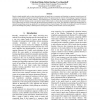Free Online Productivity Tools
i2Speak
i2Symbol
i2OCR
iTex2Img
iWeb2Print
iWeb2Shot
i2Type
iPdf2Split
iPdf2Merge
i2Bopomofo
i2Arabic
i2Style
i2Image
i2PDF
iLatex2Rtf
Sci2ools
114
click to vote
LREC
2008
2008
UnsuParse: unsupervised Parsing with unsupervised Part of Speech Tagging
Based on simple methods such as observing word and part of speech tag co-occurrence and clustering, we generate syntactic parses of sentences in an entirely unsupervised and self-inducing manner. The parser learns the structure of the language in question based on measuring `breaking points' within sentences. The learning process is divided into two phases, learning and application of learned knowledge. The basic learning works in an iterative manner which results in a hierarchical constituent representation of the sentence. Part-of-Speech tags are used to circumvent the data sparseness problem for rare words. The algorithm is applied on untagged data, on manually assigned tags and on tags produced by an unsupervised part of speech tagger. The results are unsurpassed by any self-induced parser and challenge the quality of trained parsers with respect to finding certain structures such as noun phrases.
Basic Learning Works | Education | Hierarchical Constituent Representation | LREC 2008 | Speech Tag Co-occurrence |
Related Content
| Added | 29 Oct 2010 |
| Updated | 29 Oct 2010 |
| Type | Conference |
| Year | 2008 |
| Where | LREC |
| Authors | Christian Hänig, Stefan Bordag, Uwe Quasthoff |
Comments (0)

